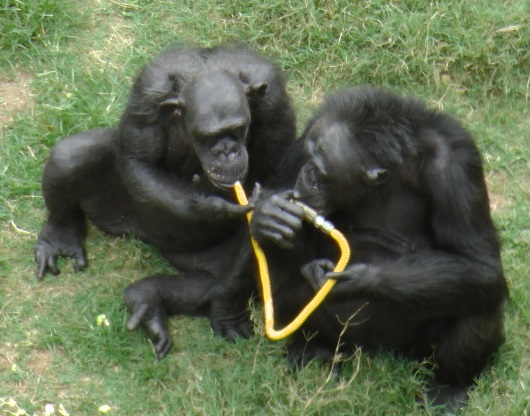Chimps pass on knowledge to the next generation

Passing skills down through the generations, previously thought to be unique to humanity, has been discovered in chimpanzees.
The phenomenon of passing on behavioural traditions, known as “animal cultures”, has been seen in other animals, e.g., chimpanzee tool use or the migratory routes of birds or even the songs of whales.
However, the ability of humans to evolve these skills over generations by building on previous knowledge, a process known as “cumulative culture”, for example the way people have evolved wheeled-vehicles over the centuries, was thought to separate humanity from the rest of nature.
Now, new behavioural experiments with chimpanzees, led by the University of St Andrews, suggests that these apes may indeed share some of the foundations of our remarkable cultural nature.
Primatologists from the University of St Andrews, working with colleagues in the world’s largest ape research centre in the US, presented chimpanzees with a novel opportunity: sucking through straws to get juice from a large container just outside their enclosure.
To create the potential for cumulative culture, a range of different objects were available: from sticks to dip in the juice, to various tubes that could be used as straws. The most complicated tool was one which needed to be unfolded, with a valve which needed to be unscrewed to create a long straw to reach the juice from the deep container.
Chimpanzees presented only with this complex option failed to exploit it – it was a very novel challenge for ape minds. However in other groups, where one chimpanzee had been trained to use the complicated tool, other chimpanzees watched and copied them, with this behaviour then spreading through the group.
However, other groups not provided with a trained member, did see some chimpanzees create this complex behaviour by themselves by pooling of partial discoveries by different individuals who had already mastered using the simpler straws.
This discovery shows that complex traditions can arise through collective understanding and cumulative practice.
Professor Andrew Whiten of the University of St Andrews, who led the study, said: “Perhaps the most fundamental thing this study shows is that a group of chimpanzees can appear more intelligent than any single individual – together they can create more advanced steps in cultural evolution.
Lead author Dr Gillian Vale, of the University of Texas, added: “Our chimpanzees were capable of learning increasingly complex behaviours by observing knowledgeable individuals. This and other recent studies are beginning to show that some non-human animals are better equipped to improve the complexity of their cultural behaviours over time than was previously believed.”
The researchers emphasise that cumulative progress occurred only when a challenging ‘ecological change’ was created by the experimenter: simple tools the chimps had been using became no longer available.
The scientists suggest this is significant for understanding what may have happened in the course of human evolution as new skills were required to deal with radical ecological changes as forests gave way to savannas, with “cumulative culture” accelerating particularly during ice ages.
Background information
This research was funded by a research grant of the John Templeton Foundation, USA.
A more detailed, two-page lay account of the experiment and related recent studies and articles by the research group is available from the authors or the Press Office.
Vale, G. L., Davis, S. J., Lambeth, S. P., Schapiro, S. J. & Whiten, A. (2017). Acquisition of a socially learned tool use sequence in chimpanzees: Implications for cumulative culture. Evolution and Human Behavior. DOI
Issued by the University of St Andrews Communications Office, contactable on 01334 467310 or [email protected].
Category Research